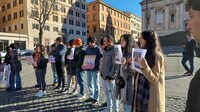Depleted uranium is slaughtering the people of Afghanistan
All the western media are celebrating the victory of Hamid Karzai (55.3% of the vote) as "the first democratically elect president in the history of Afghanistan". And from this democratic event, many politicians, political analysts and experts (always from the west) are drawing the best auspices for the future of the Afghan people.
But Jooma Khan does not share the same opinion. Who is he and how does he dare? Jooma Khan is an old man that lives in a village of the Laghman province, in the north east of Afghanistan. Jooma said: "After that the Americans have destroyed our villages and killed many of us, we have been left without our houses and we do not have anything in order to feed us. In any case we still would have been able to overcome these sufferings and we would even have accepted to them, if the Americans would not have condemned all of us to death. When I have seen my nephew born deformed I fully understood that my hopes for the future had
disappeared. That is different from the desperation that was experienced during the Russian barbarities, even if at that time I lost my older son, Shafiqullah. This time I feel instead that we are all part of the invisible genocide that the United States has thrown on us, a silent death from which we will not be able to escape ". The testimony of Jooma Khan is one of many that were rendered in front of the International Court for Afghanistan.
This court, that is an initiative of Japanese citizens, has just concluded an inquiry that lasted two years and that regards the consequences related to the use of the depleted uranium in Afghanistan. Depleted uranium is what the Americans have scattered liberally during the frightful 2001 - 2002 bombardments to kill or capture one man, that is Osama Bin Laden, whom they have still not captured, razing Afghanistan to the ground in the process.
The depleted uranium, after its outbreak, transforms into an extremely fine powder, whose single particles are smaller than a bacterium or of a virus. It is estimated that the accumulation in a person of one millionth of a gram of depleted uranium is sufficient to be fatal by being able to destroy to the immune system (that is, the leukemia that have also hit thirty of our soldiers who have operated in Kosovo) and to alter the genetic code. Today from 500 to 600 tons of this deadly material are scattered on all the Afghan territory. For this reason children are being born without eyes, without arms, with frightful tumors to the mouth, and without or with deformed genitals. For the future of these people there is the certainty that in a short time they will be able too, in the evening, sit in front of the TV and watch "The Heritage" or something like it, but many will simply be crippled.
But they will have the comfort of having become a democratic people. To tell the truth, the democracy that is now ruling in Afghanistan is a little peculiar since it has been installed it through the force of bombs. If the Afghan people have gone to vote nearly in mass, this is not due to an unexpected enthusiasm for a system in which the overwhelming majority does not perceive completely it’s usefulness, by being a stranger to the history and the traditions of that country. Rather, because of the warrior heads, people like Ismail Khan, Dostum and Karzai, that have forced their tribes and their clans to vote in order to lay down the basis of their personal power in the new filo-american government. And if after the elections the Afghans have not come down in the roads to celebrate, like the western observatories expected them to do after such a massive voting turnout, this is because they know very well that for them, nothing changes. If something does, it is only going to make the entire situation worse.
People like Ismail Khan, Dostum and Karzai will keep being those robbers, those thieves, those rapists, those murderers, that they had become after ten years of war against the Soviet Union, a war that plunged the country into poverty and that transformed them from being valorous warriors in robbers. Therefore the advent of the Taliban is justified this way: they had brought back order - even if a very hard order - in a country that had degraded into chaos. Regarding Afghanistan before the Soviet invasion - a well balanced society between tradition and elements of modern society - the Taliban represented an ideological straining. But they were an Afghan solution for an Afghan problem. Not an American solution for a problem or, better said, an American hysteria and in order to satisfy obvious economic and strategic interests of the United States.
The Taliban had won the game against Dostum, Ismail Khan and Karzai, and they had obliged them to leave the country and to find refuge within their protecting Iranians or Russians or Americans. The Taliban did so with traditional weapons, along the warrior customs of that people, because from an ethical point of view they were better motivated and more credible (their spiritual leader, the mullah Omar, lived poorly in a house of seven rooms, while Ismail Khan in a gigantic villa) and they had conquered the confidence of all of rural Afghanistan - that is nearly all Afghanistan - that was extremely tired of the abuses of corrupted "warlords". Their victory was however reversible, if they had lost this confidence. The "depleted uranium" democracy, beyond delivering the country to the foreign domination, just masked by the Quisling of turn, instead removes from the Afghans, as the old Jooma Khan says, also the hope of a future for many generations to come.
Articoli correlati
 Cosa possiamo fare per lui
Cosa possiamo fare per luiDavid McBride, un nuovo caso Assange
In questa pagina web puoi leggere la storia di questo coraggioso avvocato militare australiano che ha denunciato i crimini di guerra in Afghanistan. E' stato condannato per aver obbedito alla sua coscienza e rivelato la verità.22 maggio 2024 - Alessandro Marescotti Sit organizzato dall'Associazione socioculturale Newroz
Sit organizzato dall'Associazione socioculturale NewrozContro l'apartheid di genere in Afghanistan e la persecuzione delle donne hazara
Gli Hazara sono un popolo nativo dell'Afghanistan e costituiscono più di un quarto della popolazione. Sono più di centotrenta anni che vengono massacrati nella loro patria; le loro terre sono state confiscate e sono stati sfrattati con la forza dalle loro case con omicidi mirati.25 gennaio 2024 - Patrizia Sterpetti Si tratta dell'ex-avvocato militare australiano David McBride
Si tratta dell'ex-avvocato militare australiano David McBrideRivelò crimini di guerra in Afghanistan: lo stanno processando
L’ultima udienza è si è tenuta il 12 novembre 2023. Mentre entrava in tribunale McBride ha dichiarato: “Oggi servo il mio Paese”. Rischia fino a 50 anni di carcere ma rivendica di aver agito nell'interesse pubblico rivelando azioni criminali. Organizziamo un'azione di sostegno dall'Italia?16 novembre 2023 - Redazione PeaceLink- Whistleblower
David William McBride
David William McBride è un informatore australiano ed ex maggiore dell'esercito britannico ed avvocato dell'esercito australiano. Dal 2014 al 2016 McBride ha fornito all'Australian Broadcasting Corporation (ABC) informazioni sui crimini di guerra commessi dai soldati australiani in Afghanistan.16 novembre 2023 - Redazione PeaceLink
Sociale.network